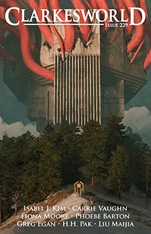 Clarkesworld #229, October 2025
Clarkesworld #229, October 2025
“Wire Mother” by Isabel J. Kim
“The Cancer Wolves” by Fiona Moore
“Crabs Don’t Scream” by H.H. Pak
“Understudies” by Greg Egan
“Giant Grandmother” by Liu Maijia (translated by Blake Stone-Banks)
“The Job Interview” by Carrie Vaughn
“In Luck’s Panoply Clad, I Stand” by Phoebe Barton
Reviewed by Chuck Rothman
Clarkesworld starts out its nineteenth anniversary issue in October with “Wire Mother” by Isabel J. Kim. Cassie is a teen whose mother has died, and her father created AMY, a computer consciousness with all her memories. He accepts her, but Cassie cannot because she has what’s termed “Emotional Contagion Disorder,” where she cannot relate to her mother’s program as her mother. Then she learns a code that will destroy the program. Well-thought-out situation and some interesting emotional depth.
Fiona Moore’s “The Cancer Wolves” is set in a post-apocalyptic world—not the usual dark and lawless cliché, but one where people are learning to move on. Morag is running a farm with the help of the robot Seamus, when wolves start showing up, threatening their sheep. The wolves were bred in a nearby research facility for their cancer resistance but are now feral. Morag wants to find a way to deal with them peacefully. Good worldbuilding and I liked the way it avoided all the dark post-apocalypse stories that seem to be the norm these days.
“Crabs Don’t Scream” by H.H. Pak has an alien time traveler falling in love just before the end of the world, but they keep leaping back in time. The protagonist is there to observe and muses on life and assignment. Not really my cup of tea, and though the story works somehow, I couldn’t relate to it.
When I was in high school, there was a competition called “Mathletes,” where students competed to solve mathematical problems. Greg Egan uses this as a basis for “Understudies” where students are given devices—Cyranos—to learn through dreams. The question arises whether this is a form of cheating, and some students decide to create a challenge to prove mathematical prowess. These are similar to the Mathlete competitions of my youth. The problem is that most of the story consists of showing a problem and the students solving it. I don’t know anyone who enjoys reading about math problems, and the story bogs down as it shows the competition in minute detail. I usually like Egan’s work, but this was a misfire.
“Giant Grandmother” by Liu Maijia has A-Ji interrupted just before she is about to evolve by her grandmother, who has become an elephant. In this world, at a certain point you moved on by evolving instead of using genetic engineering in order to allow you to travel to other worlds. Her grandmother gives A-Ji advice about her upcoming change. Fascinating concept with a discussion of what it means to be human.
Carrie Vaughn contributes “The Job Interview” where Lisle Rinzelli is in charge of navigational systems on the Roth space station and gets the news that there’s something wrong with the communication systems. Rinzelli has to maneuver within the red tape imposed by a new commander to try to get people to fix it, but is thwarted in her efforts. This reminds me of a type of old Analog story where a competent administrator is stymied by red tape, and works out to be a good read.
“In Luck’s Panoply Clad, I Stand” by Phoebe Barton features a giant alien called Alice Trimble who is stranded on Earth and is helping the humans survive the nuclear winter after a war. Alice is offered a way to leave Earth and go home. Interesting character who stands up for her beliefs.
Chuck Rothman’s novel The Cadaver Princess is out from Amazing Stories Selects. He’s online at chuckrothman.com and blogs at greatbutforgotten.blogspot.com.